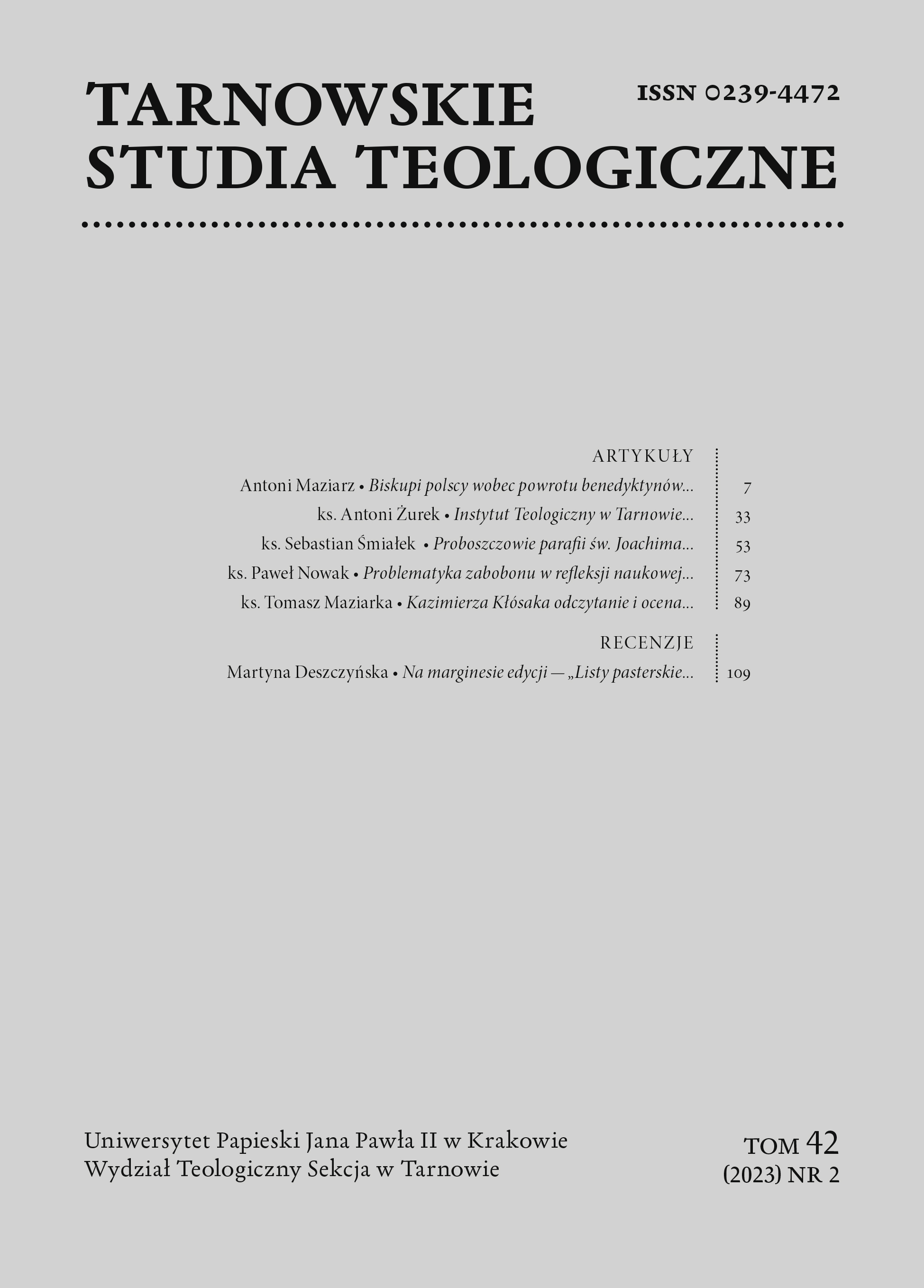Kazimierz Kłósak reading and assessment of Pierre Teilhard de Chardin’s position on the issue of the creation of man and his nature
DOI:
https://doi.org/10.15633/tst.42205Keywords:
Kazimierz Kłósak, Pierre Teilhard de Chardin, creation of the soul and evolution, the problem of anthropogenesis, Christian evolutionismAbstract
The article is an attempt to answer the question: how did Kazimierz Kłósak read and interpret Pierre Teilhard de Chardin’s views on the origins of Man and his nature? It shows that although the Kraków philosopher extensively popularized the work of the French naturalist in Poland, he sometimes argued with him and interpreted him in a specific way. The key issue was an attempt to understand the act of God creating the human soul in the context of evolution. Teilhard’s answer was that the human soul developed through evolution because spirit existed in primeval matter; the appropriate composition of matter generated spirituals phenomena. Although Kłósak tries to defend Teilhard from the accusation of materializm, he ultimately fails to save him for orthodoxy. According to the classical theorem defined by St. Thomas Aquinas and supported by Kłósak, the human soul was created from its own nothingness and the nothingness of the subject (ex nihilo sui et subiecti). In Teilhard’s solution, the human soul was created from the animals soul, and therefore it was created from its own nothingness, but not from the nothingness of the subject. Teilhard’s solution is therefore not a „creation” in the stricte sense of the word. Based on the main thread, the article addresses import ant methodological issues regarding the study of the problem of human origins and the creation of the human soul.
References
Hałaczek B., Ksiądz Kłósak — polskim Teilhardem de Chardin, „Studia Philisophiae Christianae” 28 (1992) nr 2, s. 9–13.
Kazimierz Kłósak, red. A. Lemańska i in., Kraków 2020.
Kłósak K., „Fenomenologia” ks. P. Teilharda de Chardin w ramowej analizie epistemologicznej metodologicznej, „Roczniki Filozoficzne” 12 (1964), s. 93–105.
Kłósak K., Antropogeneza w empiriologicznym ujęciu ks. P. Teilharda de Chardin, „Zeszyty Naukowe KUL” 6 (1963) nr 4, s. 3–18.
Kłósak K., Ks. Piotr Teilhard de Chardin a zagadnienie monogenistycznych początków ludzkości, „Studia Theologica Varsaviensa” 1 (1963) nr 2, s. 83–113.
Kłósak K., Natura człowieka w „fenomenologicznym” ujęciu ks. Teilharda de Chardin, „Znak” 12 (1960) nr 11, s. 1464–1483.
Kłósak K., O właściwą interpretację i krytykę dzieł ks. Teilharda de Chardin, „Znak” 12 (1960) nr 6, s. 823–841.
Kłósak K., Próba wykorzystania „fenomenologicznej” antropologii P. Teilharda de Chardin do uzasadnienia tomistycznej filozofii człowieka, w: W kierunku prawdy, red. B. Bejze, Warszawa 1976, s. 485–496.
Kłósak K., Spór o Orygenesa naszych czasów, „Znak” 12 (1960) nr 2–3, s. 253–268.
Kłósak K., Teologiczne aspekty zagadnienia antropogenezy, „Tygodnik Powszechny” 10 (1954) nr 50, s. 3–8.
Périer P. M., Transformizm. Pochodzenie człowieka i dogmat katolicki, Paryż 1938.
Sertillanges A. D., L’idée de création et ses retentissement en philosophie, Paris 1945.
Św. Tomasz z Akwinu, Suma teologiczna, t. 7: Człowiek, cz. 2, I, 85–102, przeł. P. Bełch OP, London 1980.
Teilhard de Chardin P., Comment je crois, Paris 1969.
Teilhard de Chardin P., Le phénomène humain, Paris 1955.
Teilhard de Chardin P., Le transformisme. L’orgine de l’homme et le dogme catholique, Paris 1938.
Downloads
Published
Issue
Section
License

This work is licensed under a Creative Commons Attribution 4.0 International License.
Authors who publish with this journal agree to the following terms:
- Authors retain the copyright and full publishing rights without restrictions, and grant the journal right of first publication with the work simultaneously licensed under a Creative Commons Attribution 4.0 International License that allows others to share the work with an acknowledgement of the work's authorship and initial publication in this journal.
- Authors are able to enter into separate, additional contractual arrangements for the non-exclusive distribution of the journal's published version of the work (e.g., post it to an institutional repository or publish it in a book), with an acknowledgement of its initial publication in this journal.
- Authors are permitted and encouraged to post their work online (e.g., in institutional repositories or on their website) prior to and during the submission process, as it can lead to productive exchanges, as well as earlier and greater citation of published work (See The Effect of Open Access).

